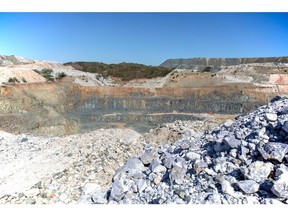
Article content
(Bloomberg) — Zimbabwe and the UK are rekindling diplomatic ties after almost three decades of tension, driven by a global surge in demand for critical minerals that’s led the former colonial power to pursue $1 billion in deals with the resource-rich nation.
THIS CONTENT IS RESERVED FOR SUBSCRIBERS ONLY
Subscribe now to read the latest news in your city and across Canada.
- Exclusive articles from Barbara Shecter, Joe O'Connor, Gabriel Friedman, and others.
- Daily content from Financial Times, the world's leading global business publication.
- Unlimited online access to read articles from Financial Post, National Post and 15 news sites across Canada with one account.
- National Post ePaper, an electronic replica of the print edition to view on any device, share and comment on.
- Daily puzzles, including the New York Times Crossword.
SUBSCRIBE TO UNLOCK MORE ARTICLES
Subscribe now to read the latest news in your city and across Canada.
- Exclusive articles from Barbara Shecter, Joe O'Connor, Gabriel Friedman and others.
- Daily content from Financial Times, the world's leading global business publication.
- Unlimited online access to read articles from Financial Post, National Post and 15 news sites across Canada with one account.
- National Post ePaper, an electronic replica of the print edition to view on any device, share and comment on.
- Daily puzzles, including the New York Times Crossword.
REGISTER / SIGN IN TO UNLOCK MORE ARTICLES
Create an account or sign in to continue with your reading experience.
- Access articles from across Canada with one account.
- Share your thoughts and join the conversation in the comments.
- Enjoy additional articles per month.
- Get email updates from your favourite authors.
THIS ARTICLE IS FREE TO READ REGISTER TO UNLOCK.
Create an account or sign in to continue with your reading experience.
- Access articles from across Canada with one account
- Share your thoughts and join the conversation in the comments
- Enjoy additional articles per month
- Get email updates from your favourite authors
Sign In or Create an Account
or
Article content
In June, the UK dispatched Minister for Africa Lord Ray Collins of Highbury to meet Zimbabwean President Emmerson Mnangagwa and other senior leaders. The trip marked a rare encounter between the two nations’ officials after years of deteriorating relations, especially under former President Robert Mugabe — a vocal critic of Britain’s 90-year colonial rule of the southern African nation.
Article content
Article content
Article content
Collins described his visit as a “mission for economic growth” that would lead to “a win-win situation” for both countries. The British Embassy in Harare echoed that sentiment in the past week, citing a $1 billion pipeline of prospective deals across key sectors such as agriculture, finance, telecommunications, renewable energy and critical minerals that it wants to close.
Article content
By signing up you consent to receive the above newsletter from Postmedia Network Inc.
Article content
It identified the 30-megawatt Vungu solar energy investment as a “beacon project” and said others will follow soon.
Article content
“The UK is working hard to increase trade and investment for mutual benefit,” a spokesperson said in an emailed response to questions.
Article content
Zimbabwe’s foreign affairs spokesperson didn’t respond to a request for comment.
Article content
Fallout
Article content
Relations between Zimbabwe and Western powers, including the UK, were largely cordial after independence in 1980, with Britain serving as the country’s biggest trading partner and a key source of aid supporting land reform and economic development. In 1997, the ties deteriorated after Britain refused to fund the land reform program. In a letter that November, the UK government said it had no colonial obligation to finance the program. That sparked tensions between the two countries and fueled debate over land redistribution in Zimbabwe.
Article content
Article content
Two years later, Zimbabwe defaulted on loan repayments, and in 2000, it began state-sanctioned farm seizures that displaced 4,500 White farmers and caused agricultural output to plunge. In response, the UK and other Western nations imposed sanctions, citing violations of property rights.
Article content
By 2024, the UK ranked as Zimbabwe’s 14th-largest trading partner, with total trade valued at $155 million — significantly overshadowed by China’s $3.9 billion and the United Arab Emirates’s $2.9 billion.
Article content
The UK’s renewed engagement with Zimbabwe reflects more than a diplomatic thaw and signals a strategic interest in critical minerals, particularly lithium, said Zaynab Hoosen, senior Africa analyst at Pangea-Risk, a specialist intelligence advisory firm. “Zimbabwe’s substantial lithium reserves offer a timely opportunity to diversify supply chains and reduce reliance on dominant producers.”
Article content
Western nations from the US to the UK are scouring the globe for greater access to critical minerals needed for clean energy, military infrastructure, advanced defense systems, semiconductors and electric-vehicle batteries.

.jpg) 2 hours ago
3
2 hours ago
3
 English (US)
English (US)